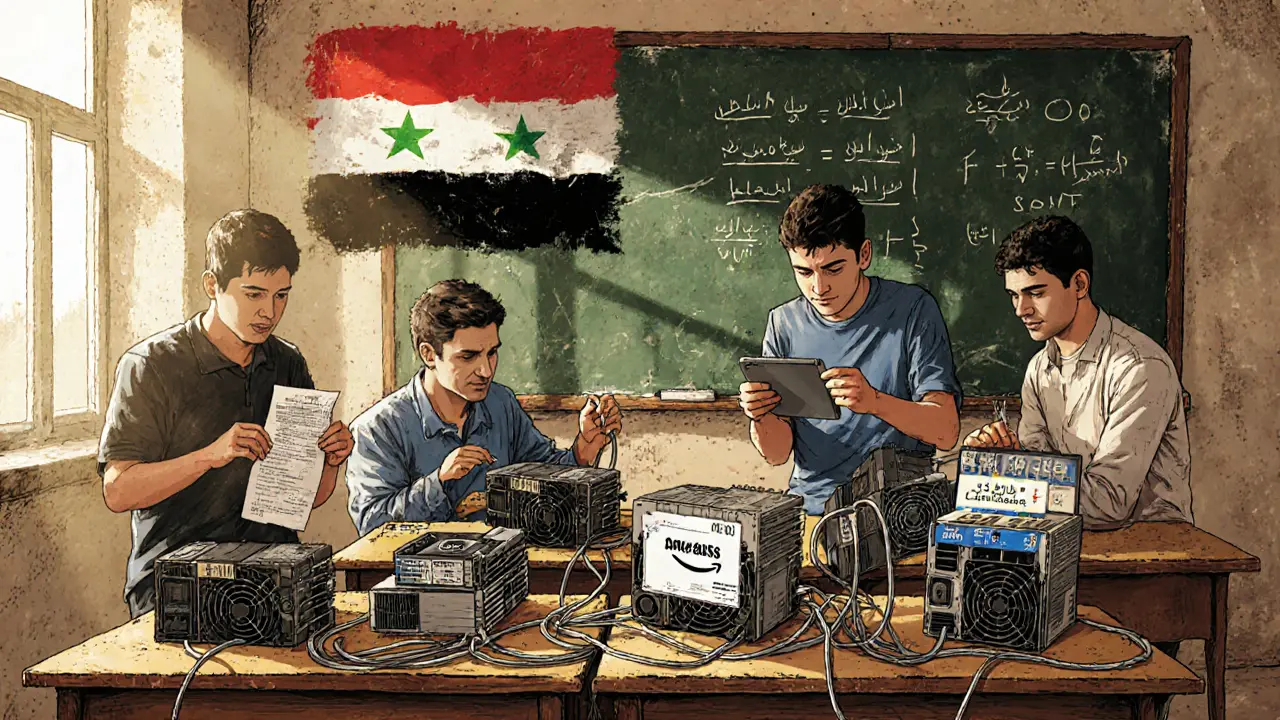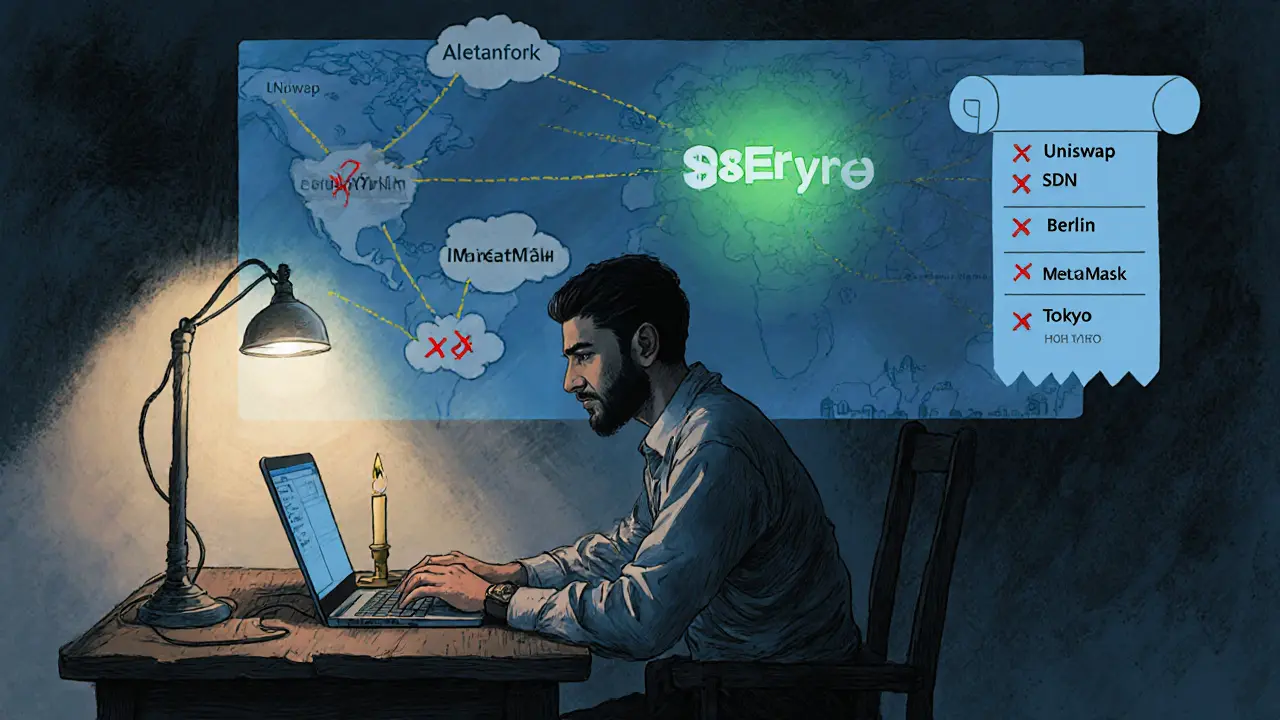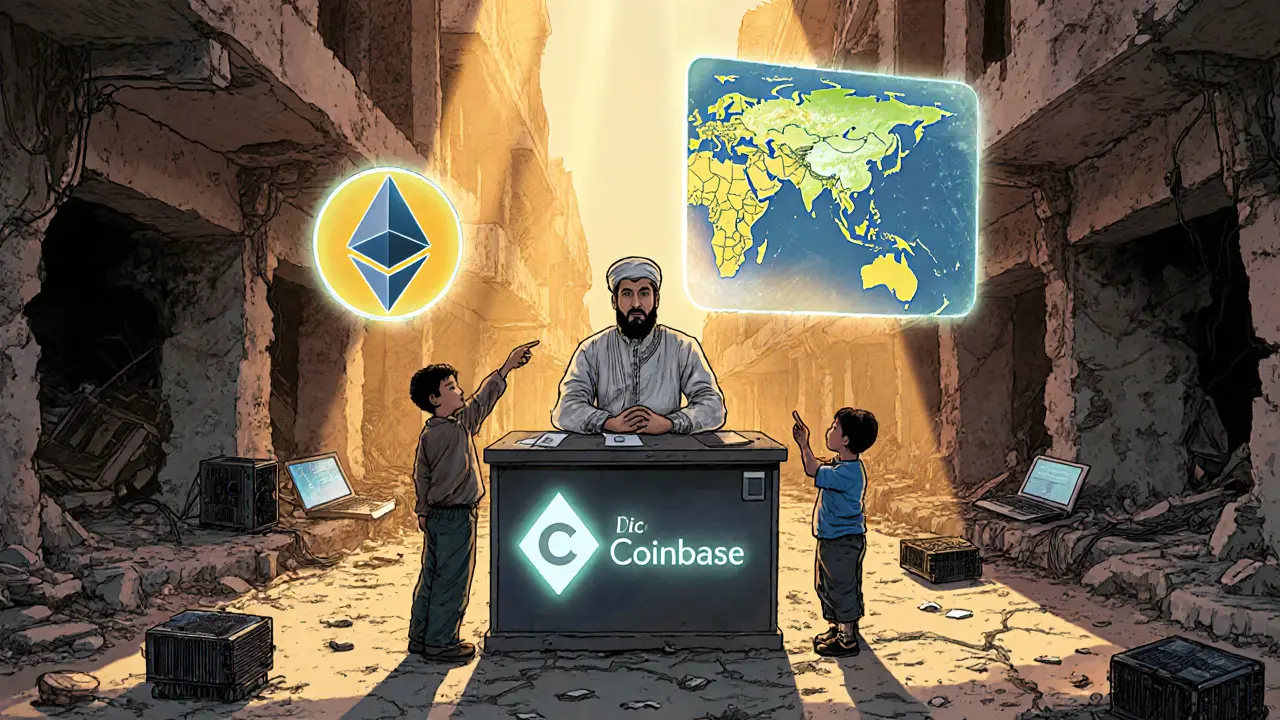OFAC Sanctions Check Tool
Check Your Crypto Address
Verify if a wallet address or entity is blocked under OFAC sanctions before sending funds.
Enter a crypto address or entity name to check if it's on OFAC's Specially Designated Nationals list.
What changed for Syrian crypto users in 2025?
In 2025, Syrian cryptocurrency users gained legal access to global digital asset markets for the first time in over 20 years. Before June, any transaction between a Syrian citizen and a U.S.-based exchange like Coinbase or Kraken was illegal under U.S. sanctions. Now, it’s not just allowed-it’s protected under new federal licenses. The shift didn’t happen slowly. It happened all at once, and it changed everything.
The sanctions were lifted-completely
On June 30, 2025, President Trump signed Executive Order 14312, which revoked six major sanctions orders that had been in place since 2004. These orders had blocked Syrians from using U.S. financial systems, including cryptocurrency platforms. The national emergency declared in 2004, originally tied to Syria’s support for terrorism and occupation of Lebanon, was officially terminated. Effective July 1, 2025, the blanket ban on Syrian financial activity was gone.
By August 26, 2025, the Office of Foreign Assets Control (OFAC) removed the entire Syrian Sanctions Regulations (SySR) from the Code of Federal Regulations. That means the legal framework that once made it a crime for a Syrian to hold Bitcoin through a U.S. wallet no longer exists. The regulations weren’t tweaked-they were erased.
General License 25 made it legal
Even before the full removal, General License 25, issued on May 28, 2025, gave Syrians a legal backdoor. It authorized all transactions that were previously blocked under the Syrian Sanctions Regulations. This included sending crypto to U.S. exchanges, using U.S.-based DeFi protocols, or even running a node on a blockchain network hosted in America. The license didn’t ask for permission-it gave blanket approval.
For Syrian users, this meant they could finally use platforms like Binance, Coinbase, or MetaMask without fear of violating U.S. law. Before, they relied on VPNs, offshore exchanges, or informal peer-to-peer trades. Now, they can transact openly. The license also protected service providers. Exchanges no longer had to refuse Syrian customers outright-they just needed to follow new screening rules.
Who’s still blocked?
The relief wasn’t universal. OFAC didn’t remove all sanctions. Over 100 individuals and entities tied to the Assad regime, human rights abusers, Captagon traffickers, ISIS, Al-Qa’ida, and Iran-backed militias remain on the Specially Designated Nationals (SDN) list. This means Syrian crypto users aren’t automatically free to do anything-they just aren’t blocked by default.
Exchanges now have to screen users more carefully. A Syrian citizen with no ties to the regime can open an account. But if that same person is linked to a sanctioned individual or business-even indirectly-they’re still blocked. This creates a new kind of challenge: distinguishing between ordinary people and those tied to repression.
Many small exchanges still refuse Syrian users out of caution. They don’t have the compliance tools to screen properly. But larger platforms like Kraken and Bitstamp have updated their systems to accept Syrian customers who pass basic identity checks and aren’t flagged by OFAC’s SDN database.

The SDN list was cleaned up
OFAC removed 518 individuals and entities from the SDN list who were only sanctioned under the old Syrian sanctions program. These weren’t major regime figures-they were doctors, engineers, small business owners, and students who had been caught in the broad net of economic isolation. Their names were scrubbed from the list, and with them, their access to global finance was restored.
One Syrian developer in Aleppo, who built a local blockchain-based supply chain tracker, told a reporter in September 2025 that he’d been using a Turkish exchange to convert his crypto to USD. After the sanctions were lifted, he opened a Coinbase account directly. Within two weeks, he’d raised $12,000 in crypto donations from international supporters to expand his project. That kind of story became common.
Technology imports are now legal
The Bureau of Industry and Security (BIS) didn’t just follow OFAC’s lead-they went further. On September 2, 2025, they launched License Exception Syria Peace and Prosperity (SPP). This new rule allows any U.S. company to export EAR99 items to Syria without a license. EAR99 covers most commercial technology-not high-end military gear, but things like mining rigs, servers, laptops, and blockchain software tools.
Before this, importing a $500 mining rig from the U.S. required a special license that took months to approve, if it was granted at all. Now, Syrian crypto miners can order equipment directly from Amazon or Newegg. Local tech shops in Damascus and Homs are already stocking imported hardware. A group of university students in Hama started a community mining cooperative using 12 imported ASIC miners. They’re now earning over $3,000 a month in Bitcoin.
What about the Caesar Act?
The Caesar Syria Civil Protection Act of 2019 imposed sanctions on anyone investing in Syria’s infrastructure. But in early 2025, the State Department issued a 180-day waiver for Section 7412, which temporarily suspends those restrictions for projects that support digital inclusion, energy, and communications.
This opened the door for international tech firms to partner with Syrian startups. A Canadian blockchain firm partnered with a Syrian NGO to build a decentralized ID system for refugees. A U.S.-based cloud provider offered free server space to Syrian DeFi developers. These partnerships were impossible before September 2025.

Compliance is now the biggest hurdle
The biggest challenge for Syrian crypto users isn’t legality-it’s access. Many platforms still don’t know the rules changed. Some still block Syrian IP addresses out of habit. Others require documents that are nearly impossible to get in war-torn areas, like notarized government IDs or proof of address.
OFAC’s guidance to financial institutions, issued in June 2025, encourages a risk-based approach. That means exchanges should focus on actual threats, not blanket denials. But not every platform has the resources to implement this. Smaller exchanges may still refuse Syrian users, not because they can’t, but because they don’t know how.
For users, the solution is simple: use platforms that have updated their compliance systems. Coinbase, Kraken, Bitstamp, and Binance now all accept Syrian users who complete standard KYC. They just need to make sure they’re not linked to a sanctioned person.
What’s next?
OFAC plans to replace the old Syrian Sanctions Regulations with a new framework called the "Promoting Accountability for Assad and Regional Stabilization Sanctions Regulations" (PAARSS). This isn’t a return to the old system-it’s a new one. PAARSS will focus only on specific bad actors: regime officials, war criminals, drug traffickers, and terrorists.
That means future rules won’t target Syrians as a group. They’ll target individuals. And that’s a major shift in U.S. policy. It recognizes that sanctions shouldn’t punish entire populations. It’s a model that could be used in other countries, like Iran or Venezuela.
For Syrian crypto users, the future is open. They can now participate in global DeFi, earn stablecoins, trade NFTs, and even build their own blockchain projects. The barriers are gone. The only thing left is learning how to use the tools.
What should Syrian crypto users do now?
- Choose a regulated exchange that confirms it accepts Syrian users (Coinbase, Kraken, Bitstamp)
- Complete standard KYC-use your national ID or passport
- Check the OFAC SDN List yourself before sending or receiving large amounts: https://sanctionssearch.ofac.treas.gov
- Avoid transactions with known regime-linked addresses or wallets
- Use hardware wallets like Ledger or Trezor for long-term storage
- Stay updated: PAARSS regulations may add new rules in 2026
Are Syrian crypto users now completely free from U.S. sanctions?
No-not completely. The blanket sanctions on all Syrians were lifted, but targeted sanctions still apply. Individuals tied to the Assad regime, human rights abusers, ISIS, Al-Qa’ida, or Iran-backed groups remain blocked. Syrian users must ensure they’re not linked to anyone on OFAC’s SDN List. For most ordinary citizens, however, crypto access is now legal and protected under General License 25.
Can I use U.S. crypto exchanges like Coinbase if I’m from Syria?
Yes, you can. As of September 2025, Coinbase, Kraken, and Bitstamp all accept verified Syrian users. You’ll need to provide a government-issued ID and complete their standard KYC process. Make sure your account isn’t flagged for association with a sanctioned person. If you’re unsure, check the OFAC SDN List before signing up.
What happens if I accidentally transact with a sanctioned person?
If you unknowingly send crypto to a sanctioned address, your transaction may be frozen or reversed by the exchange. You won’t be criminally charged unless there’s evidence you knowingly avoided screening. Most platforms have automated systems that flag risky addresses. Always double-check recipient addresses using OFAC’s public search tool before sending.
Can I mine Bitcoin in Syria now?
Yes. Since September 2, 2025, you can legally import mining equipment from the U.S. under License Exception SPP. You can buy ASIC miners, power supplies, and cooling systems without a special license. Many Syrians are now running small-scale mining operations from home. Electricity costs remain high, but profits from Bitcoin mining can cover equipment in under six months.
Is it safe to use DeFi protocols like Uniswap from Syria?
Yes, it’s safe and legal. Decentralized protocols like Uniswap, Aave, and Compound don’t require KYC, so they’re not subject to the same screening rules as centralized exchanges. As long as you’re not interacting with a wallet linked to a sanctioned entity, you can use DeFi freely. Use a non-custodial wallet like MetaMask and avoid connecting to platforms that block Syrian IPs.
Will OFAC bring back sanctions in the future?
It’s unlikely unless there’s a major shift in Syria’s political situation. The new PAARSS framework is designed to be permanent and targeted. It focuses only on bad actors, not entire populations. The U.S. government has signaled this is a long-term policy shift, not a temporary pause. The goal is financial inclusion for civilians while isolating only those responsible for violence and corruption.

naveen kumar
November 2, 2025 AT 00:46Wesley Grimm
November 3, 2025 AT 08:23Masechaba Setona
November 4, 2025 AT 08:51Kymberley Sant
November 4, 2025 AT 14:22Edgerton Trowbridge
November 5, 2025 AT 08:10Matthew Affrunti
November 6, 2025 AT 10:59mark Hayes
November 6, 2025 AT 19:05Derek Hardman
November 8, 2025 AT 15:33Eliane Karp Toledo
November 9, 2025 AT 05:27alvin Bachtiar
November 9, 2025 AT 19:42Josh Serum
November 11, 2025 AT 11:34DeeDee Kallam
November 12, 2025 AT 02:01Helen Hardman
November 12, 2025 AT 11:58Bhavna Suri
November 14, 2025 AT 03:51Sammy Krigs
November 15, 2025 AT 15:09Bruce Bynum
November 16, 2025 AT 01:40Phyllis Nordquist
November 16, 2025 AT 12:36Eric Redman
November 18, 2025 AT 05:24Jason Coe
November 18, 2025 AT 08:46Brett Benton
November 19, 2025 AT 08:42